 Petzlover
Petzlover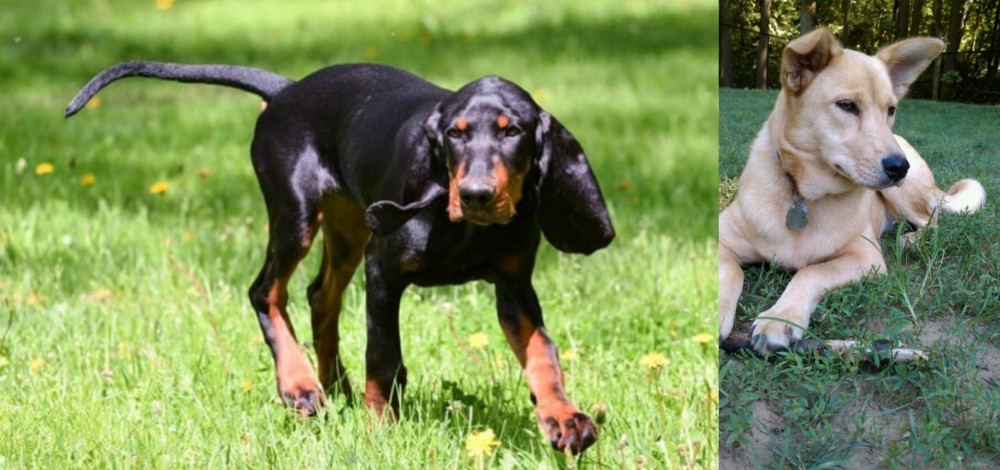 Both Black and Tan Coonhound and Carolina Dog are originated from United States. Black and Tan Coonhound may grow 8 cm / 4 inches higher than Carolina Dog. Black and Tan Coonhound may weigh 14 kg / 31 pounds more than Carolina Dog. Black and Tan Coonhound may live 3 years less than Carolina Dog. Black and Tan Coonhound may have more litter size than Carolina Dog. Both Black and Tan Coonhound and Carolina Dog requires Moderate Maintenance.
Both Black and Tan Coonhound and Carolina Dog are originated from United States. Black and Tan Coonhound may grow 8 cm / 4 inches higher than Carolina Dog. Black and Tan Coonhound may weigh 14 kg / 31 pounds more than Carolina Dog. Black and Tan Coonhound may live 3 years less than Carolina Dog. Black and Tan Coonhound may have more litter size than Carolina Dog. Both Black and Tan Coonhound and Carolina Dog requires Moderate Maintenance.
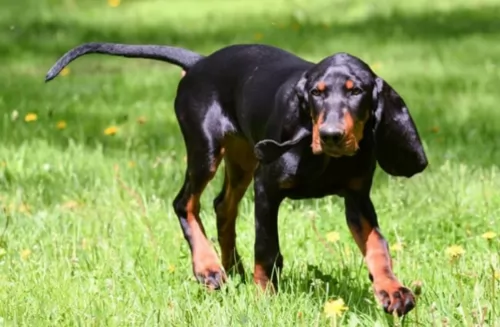 Descendent of the English Talbot Hound, the Black and Tann Coonhound is nevertheless an American creation. Developed by crossing the Black and Tan Virginia Foxhound with the Bloodhound in the very early years of the American experience. It is said that George Washington owned several. The very first Coonhound that was given American Kennel Club registration was the Black and Tan in 1945. They had been admitted to the United Kennel Club in 1912. The Black and Tan Coonhound is a traditional hunting dog – known by hunters as a “trail and tree hound”. This is a dog that finds its prey and trees it. They have incredibly strong instincts to hunt and need to hunt. They can track their prey for miles and if they have a scent you cannot get their attention back. They have been valued because they can “cold track”, following the scent of an animal that left the scene long ago. They are known to have tracked mountain lions and bears as well as deer and coon. They were developed to keep the American settlers safe and well fed, but also to keep them company on the trails or by the fireplace. They are the American Dog.
Descendent of the English Talbot Hound, the Black and Tann Coonhound is nevertheless an American creation. Developed by crossing the Black and Tan Virginia Foxhound with the Bloodhound in the very early years of the American experience. It is said that George Washington owned several. The very first Coonhound that was given American Kennel Club registration was the Black and Tan in 1945. They had been admitted to the United Kennel Club in 1912. The Black and Tan Coonhound is a traditional hunting dog – known by hunters as a “trail and tree hound”. This is a dog that finds its prey and trees it. They have incredibly strong instincts to hunt and need to hunt. They can track their prey for miles and if they have a scent you cannot get their attention back. They have been valued because they can “cold track”, following the scent of an animal that left the scene long ago. They are known to have tracked mountain lions and bears as well as deer and coon. They were developed to keep the American settlers safe and well fed, but also to keep them company on the trails or by the fireplace. They are the American Dog.
 The Carolina dog comes from wild dogs that used to run with the Paleo-Indians of North America, and today they can still be found in their wild state near the Georgia-South Carolina border.
The Carolina dog comes from wild dogs that used to run with the Paleo-Indians of North America, and today they can still be found in their wild state near the Georgia-South Carolina border.
Many scientists believe that the dog was first domesticated from the wolf thousands and thousands of years ago. Today there aren’t many records on the Carolina Dog’s history and it isn’t sure how long they lived their feral lifestyle in the American South, but it seems as though it was for hundreds of years.
You could say that the modern history of the Carolina Dog started in the 1980s. Dr. Pam Brisbin found a puppy at a dump site which looked like the Australian Dingo. Dr Brisbin and other scientists concluded that the Carolina Dog was a remnant of primitive dogs. Since those times the Carolina Dog has adapted well to being a domesticated pet.
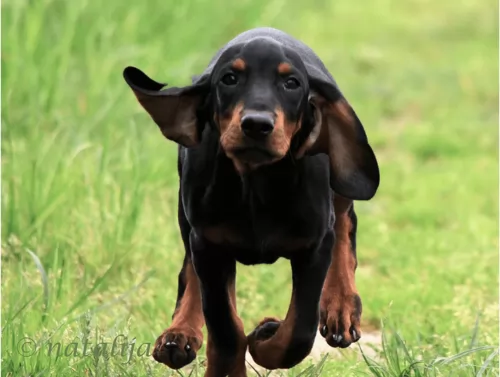 The Black and Tan Coonhound looks like we all imagine a coonhound would look. They have strong and muscular legs, an oval skull and a scissors bite. They have brown or hazel eyes that are very expressive. The ears of course are long like the bloodhound, far back on the head and thin. His nose is amazingly sensitive as he is scent hound. His nostrils are always black. He is a large, strong dog.
The Black and Tan Coonhound looks like we all imagine a coonhound would look. They have strong and muscular legs, an oval skull and a scissors bite. They have brown or hazel eyes that are very expressive. The ears of course are long like the bloodhound, far back on the head and thin. His nose is amazingly sensitive as he is scent hound. His nostrils are always black. He is a large, strong dog.
 The Carolina dog is part of the Sighthounds Group and looks a bit like a Dingo, German Shepherd and Wolf mix. He has fairly long, pointed erect ears, a sharp wolf-like snout and a long tail that curves when raised.
The Carolina dog is part of the Sighthounds Group and looks a bit like a Dingo, German Shepherd and Wolf mix. He has fairly long, pointed erect ears, a sharp wolf-like snout and a long tail that curves when raised.
The Carolina dog has been re-discovered however and when trained and socialized, they make splendid pets. It’s a medium sized dog standing at 45–61cm and weighing from 15–20kg. He is slender, muscular and athletic with a coat that is short and fairly smooth. Colors for the Carolina dog vary and he can be fawn colored, a gingerish color, black and tan and can have some white areas on the paws, chest, muzzle and tail.
The Carolina Dog has been a wild dog, belonging to a pack and while he isn’t aggressive, he is nervous and aloof around strangers. Good training and socialization provides him with the skills to get along well with his human family as well as with children and other pets in the home.
Because this dog has always been wild, they tend to maintain some of their wild, independent nature and they can be difficult to train and it requires firmness and patience with him, but he is an intelligent breed.
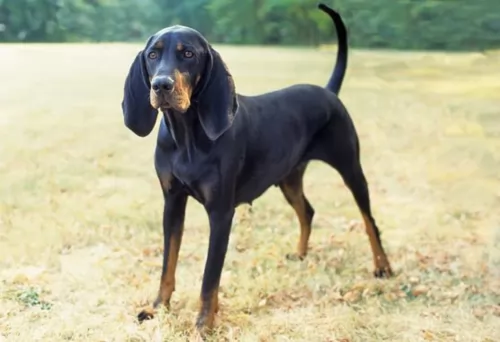 The Black and Tan Coonhound is intelligent, calm, affectionate, independent, strong, and stubborn. They love children and are gentle with them, but they are also very independent and may not do what the child wants them to do in play. They are loyal to their family and will bay at strangers. They are incredibly adaptable and happy-go-lucky. They will end up on the couch or bed so don’t try to fight it. They like cars and enjoy traveling. If you get a BTC be ready for that booming voice.
The Black and Tan Coonhound is intelligent, calm, affectionate, independent, strong, and stubborn. They love children and are gentle with them, but they are also very independent and may not do what the child wants them to do in play. They are loyal to their family and will bay at strangers. They are incredibly adaptable and happy-go-lucky. They will end up on the couch or bed so don’t try to fight it. They like cars and enjoy traveling. If you get a BTC be ready for that booming voice.
 The Carolina Dog is a medium-sized dog which has managed to survive well in the wild environment. It is this life in the wilds which has made the dog to be shy and aloof around strangers.
The Carolina Dog is a medium-sized dog which has managed to survive well in the wild environment. It is this life in the wilds which has made the dog to be shy and aloof around strangers.
They are skilled and intelligent and when domesticated they make extraordinary pets even though he isn’t an overly affectionate dog. It is why he requires early socialization so that he doesn’t grow up shunning humans.
With training however, the Carolina Dog becomes a well-adjusted, loving and social member of the family.
 The Carolina Dog is a fairly healthy breed. You won’t have to be rushing off to the vet often with him if you look after him well in terms of a good diet, a food amount of exercise and plenty of love and attention. In fact breeders of the Carolina Dog have noted that they haven’t seen any cases of genetically inheritable diseases with this robust dog.
The Carolina Dog is a fairly healthy breed. You won’t have to be rushing off to the vet often with him if you look after him well in terms of a good diet, a food amount of exercise and plenty of love and attention. In fact breeders of the Carolina Dog have noted that they haven’t seen any cases of genetically inheritable diseases with this robust dog.
However with all dogs, no matter how healthy they are, there can be problems. Problems common to domestic dogs can include skeletal and visual problems. Many dog owners have their pets tested to identify some of the potential health defects that some dogs are prone to. This can include hip dysplasia, cataracts, cancer and PRA or Progressive Retinal Atrophy.
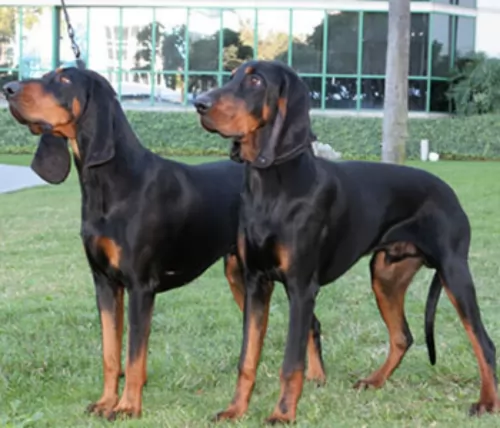 This coonhound is a big, rugged, working dog and needs to be fed accordingly. Feed him at least twice a day in smaller portions and not right before or right after exercise. Don’t send him on a hunt with a full stomach. Don’t overfeed.
This coonhound is a big, rugged, working dog and needs to be fed accordingly. Feed him at least twice a day in smaller portions and not right before or right after exercise. Don’t send him on a hunt with a full stomach. Don’t overfeed.
Not that the Black and Tan Coonhound is lazy, but he can be a couch potato when he is not working. He needs moderate exercise everyday and he does well at activities like barn hunt and field games. If he does catch a scent outdoors and he is not confined in a fence, he will follow the scent with no attention to your calls at all. He can run for miles on end when pursuing prey, but he’d also enjoy just jogging along side you or your bike. He loves long walks but make sure he is on a leash and can’t follow his nose.
 The Carolina Dog is a seasonal shedder and the shortish coat will simply require a thorough brushing twice a week to keep him in tip top condition.
The Carolina Dog is a seasonal shedder and the shortish coat will simply require a thorough brushing twice a week to keep him in tip top condition.
This dog, with his upright ears, isn’t prone to ear infections as other breeds, but nonetheless as part of his grooming routine, its a good idea to to check his ears inside for wax build-up and dirt. Certainly his teeth should be brushed 2 or 3 times a week with special dog toothbrush and toothpaste. This keeps the gums and teeth healthy and also avoids other diseases that come about because of dental disease.
Whether you feed your Carolina Dog once or twice a day, you want to ensure the very best quality diet to avoid skin problems and illness. You also have to ensure your dog has 24/7 access to fresh, cool drinking water to help him with digesting his food.
There are some excellent commercially manufactured dog foods on the market which have been manufactured for certain stages of your dogs life. Add in some rice, vegetables and meat from time to time and every now and again you can give him some raw meat too.